INTO THE ASHES Director Aaron Harvey Talks Crime & Revenge
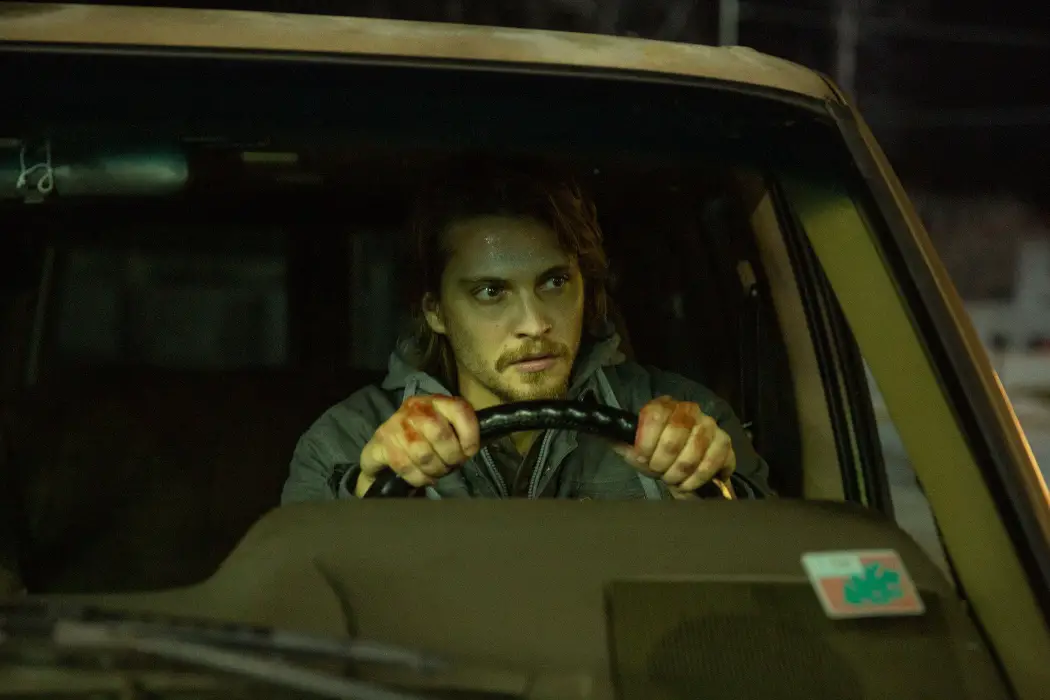
Jim Dixon retired from practicing law not a moment too…
The new crime drama Into the Ashes features Luke Grimes, Robert Taylor, James Badge Dale and Frank Grillo. The movie is written and directed by Aaron Harvey, one of the founding member of Annapurna Pictures. Harvey went on to write, direct and produce Catch .44 starring Bruce Willis, Forest Whitaker and Malin Akerman, and The Neighbor, starring William Fichtner, Michael Rosenbaum and Jessica McNamee.
Into the Ashes follows Nick (Grimes), a blue-collar ex-con, living in a small town in the Alabama countryside. When an evil from his past shows up and kills his wife, it sends Nick’s world into a tailspin. Hell-bent on revenge, Nick chases down the men, all the while having to deal with Frank (Taylor), his father-in-law and the town sheriff, who is forced to wrestle with his own morality in the midst of his daughter’s murder.
Aaron Harvey spoke exclusively with Film Inquiry about his latest film.
Jim Dixon for Film Inquiry: I watched Into the Ashes just this morning, Congratulations on a very provocative crime thriller. You’ve certainly got some fine performances in it.
Aaron Harvey: Thank you.
You wrote and directed the movie, so it seems fair to ask where the original idea came from.
Aaron Harvey: Yeah, you know the original idea started from sort of this love that I have personally for these kind of seventies man-alone, archetypical, revenge/redemption thriller films. Charley Varrick, Rolling Thunder, Friends of Eddie Coyle, or more contemporary ones – these films that deal with these greater underlying thematic implications, but they’re all couched in sort of a fun genre ride.
I wanted to contribute in some capacity to that canon, I guess, and I love those movies – I wanted to make one – so I just started thinking about it and what would be the story that I would tell, and it kind of started from that place of need where I wanted to make a movie about two men coming to terms with each other and this rectification that happens with their relationship over this unusual shared tragedy and then that sort of was the original nugget. You know you start writing and the story kind of unfolds as it goes along. I wanted it to be a regional kind of thriller, so that’s where it all began. It basically sprang from the love I have for films of this vein.
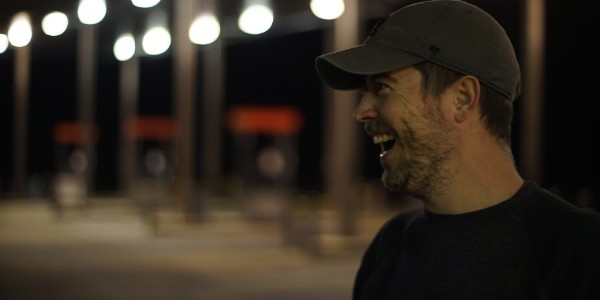
Some of the movies you mentioned I would consider to be at least descendants of film noir, and most of them do deal with professional criminals. Rolling Thunder is an interesting exception – in that one William Devane plays a decorated war veteran who is victimized by vicious criminals when he comes home.
Aaron Harvey: Right, right.
I remember seeing Rolling Thunder when I was in college and when they put William Devane’s hand in the garbage disposal I nearly freaked. In your story you have a young ex-con who is trying to escape a criminal past which tragically catches up with him. Almost every character in this movie breaks the law at some point it seems to me.
Aaron Harvey: Yeah [laughs].
Are we trying to find a higher morality among the immoral, honor among thieves, or is it just that everybody’s complicated?
Aaron Harvey: You know what, it’s more that it’s that everybody’s complicated, and it’s funny you say that, because that was sort of what the character, Frank, the sheriff, is supposed to almost represent, dramatically – that the world is more grey and things are more complicated than you may perceive them to be, and morality is flexible to a point, all things considered, because once it becomes personal a lot of your points of view, and your ethics, if you allow them, go out the window… We can all be armchair quarterbacks in somebody else’s situation, but then when it comes knocking on your door, what do you do? How do you deal with that? I tried to put some of that into the film.
I don’t know if you remember the debacle which was the Mike Dukakis campaign, but during one of the debates Bernard Shaw asked Dukakis if he came home and found his wife lying dead on the floor with her throat slit, would he change his mind on the death penalty? That occurred to me a couple of times watching your movie – the temptation to take the law into your own hands when the loss becomes that personal.
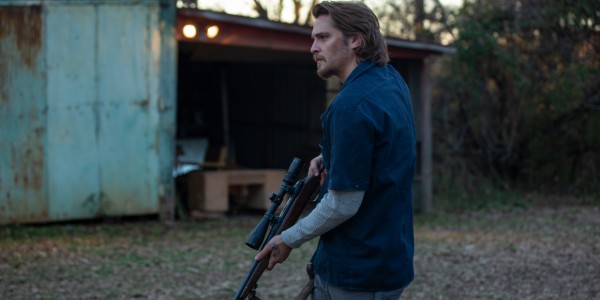
Aaron Harvey: Right, definitely. That’s definitely what the schematic underpinning idea that I was trying to get across when I was doing it – to make it feel more important that just being an out-and-out revenge movie. How do you wrestle with that? Dukakis is a good example, it’s like when it becomes personal the whole game changes. And so that’s what this film is dealing with. The whole first half of the movie is kind of losing perspective on everything – then Nick kinda goes out, and Frank comes in, and we see his perspective and how they both deal with it and ultimately coalesce at the end, and in the final moment Frank basically has to face the decision that isn’t in black and white the way he thought it would be, or what his world view would have dictated normally.
The movie opens with Robert Taylor making references to stories from The Bible, particularly the story of Samson. Do you think there is a Biblical theme in your own movie?
Aaron Harvey: I thought [Frank Grillo] is a guy who probably grew up there in the south, goes to church – that he lives a life that serves his credo. He’s a very conservative person. Everything is very set in stone, black and white, but at the same time there’s this great, ironic – in my mind – justification that people have where they look in scripture, or look in The Bible, as this guiding light.
But then the stories in there are so antithetical to the way that they act and behave, and so I think it’s like Frank is thrown for a loop by what happens to him and his daughter – it’s his way of filtering his life and rationalizing what he’s done to the point that he’s filtering it through the lens of his metaphysical story that he’s found comfort in… It’s never been personal to him, and so it just seemed like an interesting kind of motif and a fun thing to do to have him trying to find understanding through the scripture that he’s always leaned on his whole life.
What do you think is the enduring appeal of the revenge story because you can go back to at least The Count of Monte Cristo and this is a very enduring, popular theme.
Aaron Harvey: Yeah, I don’t know, not to overly psychoanalyze it but I think it’s a cathartic thing for people because I think there’s a lot of people that, in real life, even on a very minor level you always want to right the wrongs, and a lot of times you feel life isn’t fair, and how do we deal with that and so I think that there’s this cathartic thing that happens in these kinds of movies where even if we don’t respond to the story itself, everybody understands the idea of this feeling of wanting to get revenge, and obviously most of us in the world don’t do that, or wouldn’t act on that impulse.
I think it’s an escapist thing for a lot of people to go, Yeah, yeah I would do that – even if really it wasn’t so, you know, it’s kind of film in popular sort of human condition thing I think that everybody can understand and appreciate and I think that’s why it’s lived so long – Some sort of release for all of us. [laughs] I guess.
I gather you are a fan of the films of John Ford.
Aaron Harvey: Oh yeah.
In Ford’s films, of course, we frequently find strong male antagonists. The Quiet Man, one my favorites, comes to mind, and that is certainly about two strong male antagonists. You certainly have that here, first Sloan versus Nick and then Nick versus Frank. The first conflict, Sloan versus Nick, is rooted in backstory, but some of that isn’t ever fully explained to the audience. When did you decide how important that backstory was, or wasn’t, going to be?
Aaron Harvey: Pretty early on. To me, the film is very much – it’s sensory, it’s like you said it’s more thematic, it deals with a lot of these ideas and the execution of these ideas like you said, the Fordianesque kind of good versus evil, masculinity, the brotherhood – some of the ideas that were bigger than the need to sort of explain every piece of plot to the audience – overrode a lot of stuff when I was writing it. I think the audience today is a lot smarter where you don’t need to hold their hands and you don’t need to play doctor to explain it all the time and sort of give them every little thing.
To me the backstory, what literally happened between these characters, was never out-and-out that important in terms of the film. Of course actors are always interested in that, and when talking with Frank [Grillo], David [Cade] and Scott [Peat] who play that little band of merry misfits – they had ideas about it, and we talked about what could have been or what it was but I just never felt like it was really that important in the way that I was telling this story.
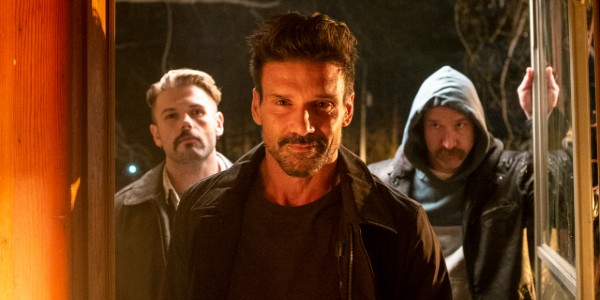
You benefit very strongly by some excellent cinematography by John Rutland. You’ve worked with him before, I believe?
Aaron Harvey: Yes. We shot our last film, The Neighbor, the one I made with William Fichtner, a couple of years ago. We did that film together and I tried to get him to do my first movie before that but we were both very young – we’re the same age and we were both in our twenties at the time – and the producers were like, no way are we giving the reins to two new guys to fly the plane into the mountain together, so – it forced me to hire some other people in that film.
That compromised it more than I would have liked and so after that experience which was not the greatest experience, I said, you know what, enough of that, I’m going to own things more creatively and work with my friend and people who I know have the talent…[John] did the first one and we’ve been good buddies since, for ten years. Yeah, we’ve done the last two films together and we’re going to hopefully do all the rest of them together.
There’s some very handsome location shooting and particularly some of the night work. You shot in Alabama pretty much entirely?
Aaron Harvey: Yeah, we shot outside of Birmingham in this little area called Bessemer. It’s sort of the surrounding country there. It was great.
Did filming there inform the movie?
Aaron Harvey: No, actually we were scouting in New Orleans initially, and it wasn’t looking like I was going to find what we were looking for, but then when we went to Alabama we ended up literally finding almost everything very close to what I had in my head, and what was on paper, in terms of the locations, and then we got very lucky with actually getting a lot of those locations because that’s always the second part of the pie.
What was the biggest challenge making the movie?
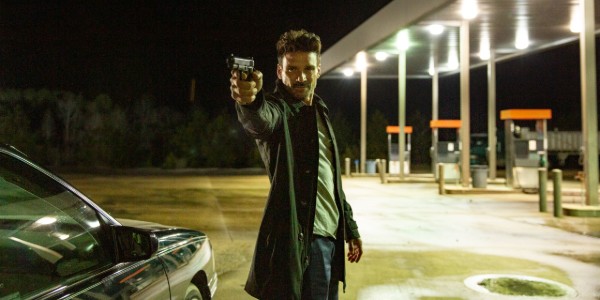
Aaron Harvey: I mean the biggest challenge is getting the film to production in the first place [laughs]. Climbing a mountain is getting the movie made – period. In terms of actual production challenges, to be honest there weren’t really that many, which is crazy on films with very limited budgets and scope and time. Weather is always a little bit tricky, but as I said before we got very lucky with our locations, we were very fortunate with the weather and for all intents and purposes it was a pretty seamless shooting.
You’re always running against time and money, but we were very fortunate with this film. We squeezed all the blood from the stones making it, but we never got any major curve balls thrown at us.
I think you got everything out of the budget. It’s a very handsome movie.
Aaron Harvey: I appreciate that.
What’s next up for you?
Aaron Harvey: I have another script that we are pushing around now trying to put some actors into – an extension of a similar kind of elevated genre movie with a lot of thematic undertones. It’s kind of like a contemporary homage to Michael Mann’s Thief, which is one of my favorite films. It deals with similar kind of character dynamics and story, but in a totally different package – a little bit updated, more contemporary, but that’s the one I think I’m actively trying to do next. It’s a little more ambitious than this film but eminently do-able, and we have some actors interested, so we’ll see and hopefully we can push that ship off the dock.
I still remember the Tangerine Dream theme to Thief. If they’re still around you should try to get them.
Aaron Harvey: Oh, I know, wouldn’t that be great? When you said that, somebody also said the same thing a music supervisor I work with and I were joking about that and he said “You should approach Tangerine Dream,” and I’m like well, let’s get there first and then we’ll talk about it. But yeah that would be a fun little throwback.
Watch Into the Ashes
Does content like this matter to you?
Become a Member and support film journalism. Unlock access to all of Film Inquiry`s great articles. Join a community of like-minded readers who are passionate about cinema - get access to our private members Network, give back to independent filmmakers, and more.
Jim Dixon retired from practicing law not a moment too soon, and now works as a freelance writer and film critic. A lifelong and unrepentant movie geek, he firmly believes that everything you need to know in life you can learn at the movies. He lives in upstate New York.













